What Can You Do With Lesser Known Masters Degree?
You might wonder if you should pursue a master’s degree but are not entirely sure which career path it can help steer you towards. Not only is there the satisfaction of gaining additional knowledge, skills and reputation but there are also potentially higher earnings on the table.
To find out where other Master’s degrees can lead you, click the image above.
Below are some simple overviews of the lesser-known Master’s degrees and which path they can lead you towards. These include:
- MClinDent
- MEd
- MMath
- MMus
- MPA
- MPH
- MPhys
- MSt
Master of Clinical Dentistry (MClinDent)
If you’re a professional in the dental industry, you may wish to consider an MClinDent degree to help further your expertise and career prospects within the industry.
What is an MClinDent?
MClinDent stands for Master of Clinical Dentistry and it’s a postgraduate qualification for those looking to progress further or enter a specialist branch in dentistry.
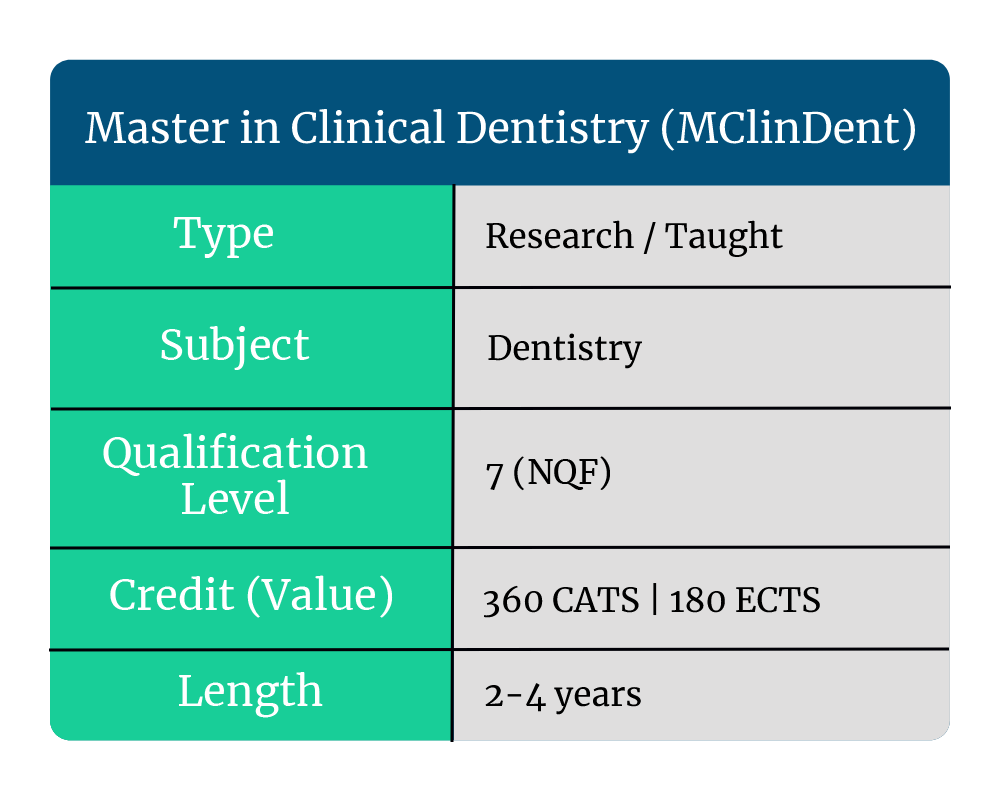
Typically, an MClinDent is a highly research-based qualification, but some courses have a mixture of taught courses too. As a research degree, you will expect to complete this within the designated term and your own time, so you should ensure the university has a member of staff to help supervise you.
MClinDent entry requirement
In order to study an MClinDent, you will require to have a BDS (Bachelor of Dental Surgery) qualification in addition to a minimum of 3 years of experience practising in a clinical capacity within your chosen field.
In minimal cases, you may be accepted if you have less than 3 years but you may require to show an exceptional degree of aspiration, amazing grades and a high-tier application form.
How long is an MClinDent and how much is it worth?
The length of the degree depends on the course and the university. Most MClinDent lasts between 2 to 3 years but you can find others which last up to 4 years. For part-time, you can expect to add an additional one or two years.
The degree is worth 360 CATS or 180 ECTS, and the breakdown in credit can differ from course to course with the dissertation worth the most overall credits.
Which career path can an MClinDent steer you towards?
If you are looking to complete an MClinDent, you will typically look to continue the same career path within dentistry. But depending on the specific course you have chosen, you will be aiming to steer towards a specific branch within dentistry such as:
- Dental Hygienists
- General Dentist
- Oral and Maxillofacial Surgeon
- Orthodontist
- Periodontist
- Prosthodontics
Master of Education (MEd)
If you’re looking into a career in the education sector, you may wish to consider an MEd degree. While a Master’s is not needed to enter the education world, it provides a useful stepping stone for more specialist teaching, consultancy or administration positions.
What is an MEd?
Magister Educationis is a master’s degree awarded by universities in many countries. The degree is often given to educational courses in teaching, counselling, psychology and administration. Similar degrees providing the same qualification include the Master of Arts in Education (MAEd) and the Master of Science in Education (MScEd).
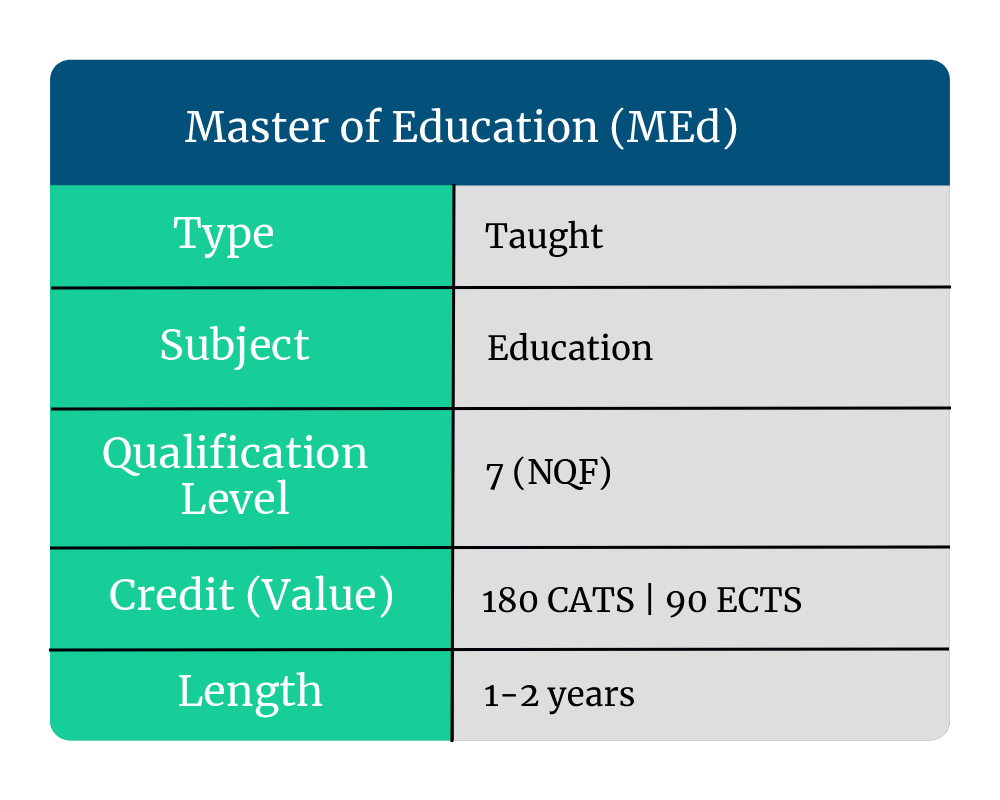
The MA version has a stronger focus on research and discussion while improving your understanding of schooling, and social and economic factors. Contrasting, MEd is more focused on practical experience and has an in-depth focus on the teaching process in addition to administration and counselling areas.
Both versions are considered equivalent in their educational level.
MEd entry requirements
For most universities the requirements are straightforward and similar – there may be some differences but you should check prior to applying.
There are a few criteria for this degree:
- Bachelor’s degree (or equivalent qualification) with a minimum grade of 2:2
- A degree with less than 2:2 but have at least two or three years of professional experience
- Teaching qualification such as a Diploma in Education and Training (DET) or similar with at least a year or two of professional experience
You may also need to provide a Disclosure & Barring Service (DBS) check or certificate as part of the application as you may be working alongside underage students or vulnerable adults.
In addition to the above, you may also need to provide an English Language test score as part of the application if English is not your first language. Learn more about the types of English Language Test.
How long is an MEd and how many credits is it worth?
The degree has a total of 180 CATS or 90 ECTS, with the dissertation amounting to the most overall credits.
Overall, the course lasts for a year full-time and two years part-time.
Which career path can an MEd steer you towards?
This degree can help open doors to a range of different career options within the education industry.
If you like to continue or remain in the teaching field, your master’s can help you work in specialised schools or at higher institutions with older students. Some examples include:
- Higher Education Teacher
- Special Education Teacher
- Teaching English as a secondary language
- Tutor
However, achieving an MEd doesn’t restrict you in a teaching role. In fact, there are various roles within the education sector which you could pursue, from leadership to content writer:
- Content Writer
- Education Administrator
- Education Consultant
- Headmaster (or other high-level positions)
- Instructional Designer
- Learning Director
Masters Degree in Education (MMath)
If you’re looking for a degree which brings new ways of approaching and analysing complex problems using maths, you may be looking at an MMath.
What is an MMath?
MMath stands for Master of Mathematics and it is an integrated Master’s degree which means it’s a program which combines Bachelor’s directly into a Master’s degree. MMath is a specific advanced degree for courses in the field of mathematics.
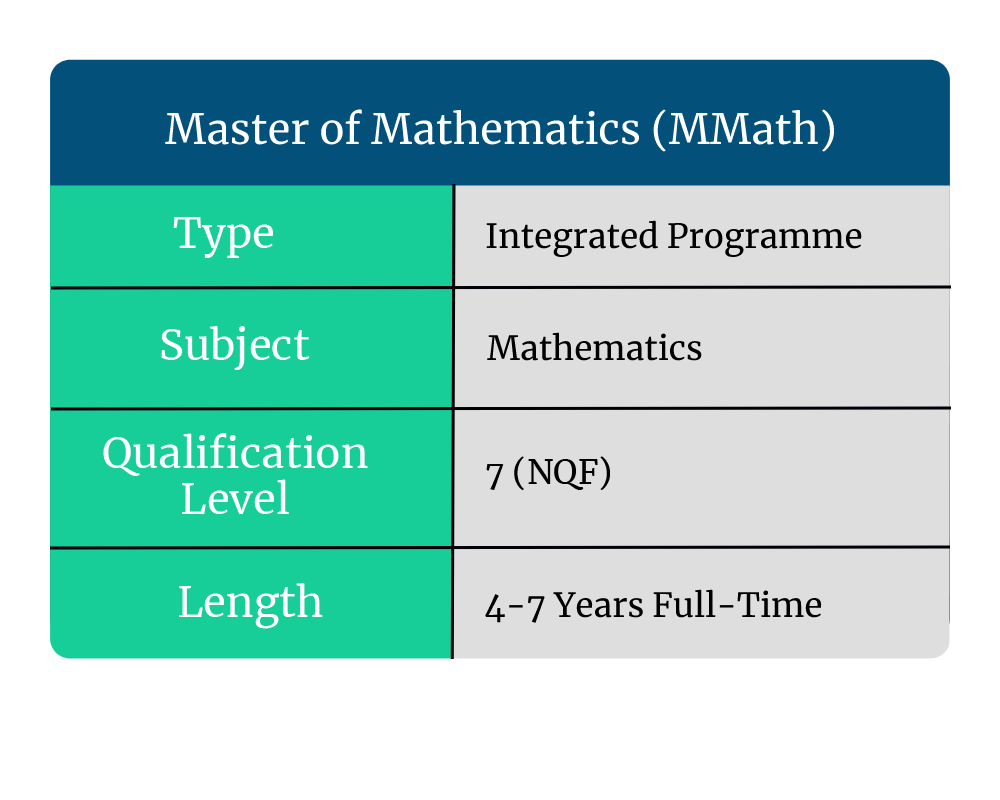
In the UK, MMath is an internationally recognised qualification at the university level. Since 1992, most leading universities have offered the program including the University of Bath, the University of Edinburgh, the University of Cambridge, the University of Oxford, and the University of Manchester.
MMath entry requirements
Unlike other Master’s, you will have to apply for an MMath through UCAS, with the codes starting at G100. As part of your A-Levels, you must have ideally taken both Mathematics and Further Mathematics. If you have not, you must demonstrate individual talents that will help your entry into the course.
To gain admissions, a majority of the universities request A-Level grades of at least an AAB to be considered as part of the widening access pool, but the higher the grades, the better chance you have at receiving admissions. If you haven’t achieved at least an AAA, you will have to demonstrate individual brilliance through other diploma/qualifications such as:
- Extended Project Qualification (EPQ)
- General Certificate of Education Advanced Extention Awards (GCE AEA)
- Maths Admission Test (MAT)
- Test of Mathematics for University Admissions (TMUA)
As an international student, you may also require to demonstrate a level of English Language competency regardless of your nationality or country of residence. You can find out more information about the different types of English Language Tests.
Be sure to research which grades you need prior to applying as each university and course requires different grades.
How long is an MMath?
An MMAth is unlike most degrees. As an integrated program, the degree will last longer than most as you’ll have to complete the “Bachelor’s” part of the program. Typically, the degree lasts between 4 to 5 years, 3 years for the Bachelor’s and one to two years for the Master’s integrated section. As the degrees differ, some courses can be slightly longer.
As an integrated programme, you will be unable to complete the ‘Masters’ section of the course part-time.
Which career path can an MMath steer you towards?
As a mathematical degree, you should expect your career directory to be aimed at roles which use mathematics on a daily basis. Such roles include:
- (Chartered) Accountant
- Data Analyst
- Financial Advisor/Trader
- Insurance Underwriter
- Investment Analyst
- Meteorologist
- School Teacher
- Software Engineer
- Statistician
Depending on your specialised field, you should expect to be employed in the following industries:
- Education
- Engineering
- Finance/Banking
- Government
- Insurance
- IT & Business
- Marketing
- Petroleum (Energy) Industries
- Space Science and Astronomy
Finance your Masters degree with a Lendwise loan
If you are looking for financial assistance to fund your Master’s degree, Lendwise is a one-stop shop for achieving your dream degree with a fair and sensible loan tailored specifically for you. Apply today above.
*9.2% Representative APR (fixed). Credit is subject to status. Only those over 18 can apply. Terms and conditions apply.
Representative Example: Assumed borrowing of £30,825 over 120 months at 12.73% APR representative. Monthly cost of £509.26. Total amount repayable of £61,199.65. Interest rate of 11.62% p.a.(fixed) and total fees of £925.00. Available for loan amounts between £5,000 – £100,000.
(Representative Example date: October 2024)
*This figure was correct as of 29 June 2023
Master of Music (MMus)
If you’re looking into a career in the music industry, you may wish to consider an MMus degree to help further your career prospects in the industry.
What is an MMus?
MMus or MM is a Master of Music postgraduate qualification with the aim to advance your exploration of all creative music practices from singing, composing, and more by gaining the necessary skills required by the industry.
Those looking to complete this type of degree primarily aim to gain entry/advance in a music career.
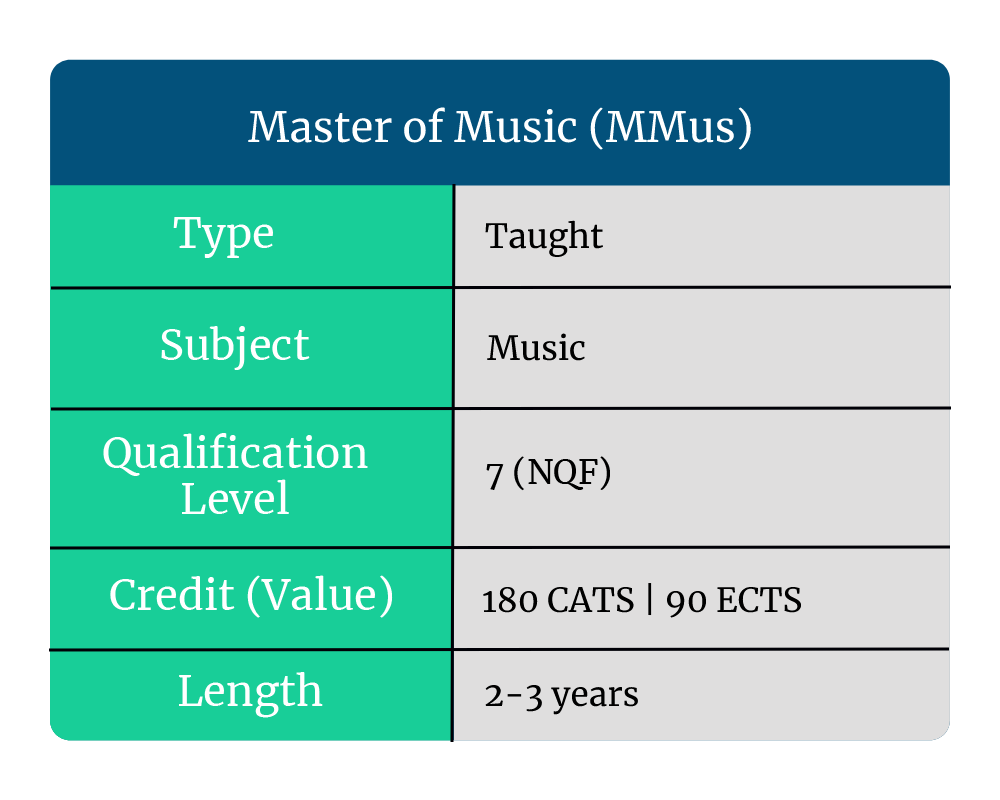
Typically, a degree in music can be awarded as a Master of Arts (MA) degree, but there can be times it’s awarded as an MMus/MM, a Master of Music Education (MMEd/MME), or a Master of Performance (MPerf). A Master of Computer Science (MComp) can be awarded to those who are looking to complete a course in digital music.
Those looking to become career musicians in sacred music for churches or other religious buildings may alternatively be granted a Master of Sacred Music (MSM).
MMus entry requirement
Admission to an MMus requires a student to have a Bachelor of Arts (BA) or Bachelor of Music (BM) as an undergraduate degree with a minimum grade of 2:2.
As part of the curriculum, you must be able to perform in a live performance which includes a wide range of musical styles, typically ranging from the Baroque Era (1600-1750), the Classical Period (1750-1800), the Romantic Era (1800-1910), 20th and 21st-century music.
How long is an MMus and how much is it worth?
Similar to other Master’s degrees, you can choose to complete the course on a full-time or part-time basis. A full-time course, most require at least a two-year commitment, while a part-time course is typically 3-years long.
To gain an MMus degree, you need to accumulate at least 180 credits over the course of your degree, or an equivalent of 90 ECTS.
Which career path can an MMus steer you towards?
Depending on the course field you have chosen, you can be steered towards a number of different paths within the music industry. These include:
- Choreographer
- Composer
- Event Manager
- Instrument Specialist
- Music Producer
- Music Technician
- Musician
- Radio Broadcaster/Producer
- School Teacher (Secondary, College, and University)
- Sound Designer
- Sound Technician (Broadcast, Film, Video, Theatre, Music)
- Special Effect Technician
- Theatre Manager
You can also combine your Music degree with another profession such as a Law degree to open routes into becoming a music industry-specialised lawyer.
Master of Public Administration (MPA)
If you’re looking to acquire a clear foundation of knowledge about the public sector, you may be looking at a Master of Public Administration (MPA) degree.
What is an MPA?
Master of Public Administration (MPA) is a degree which assists individuals who are interested in the public sector as a whole to acquire a clear foundation of knowledge and development of the public sector. Here you will learn the social trends and evolutions while preparing people with the leadership skills and tools to help change the world into a better place.
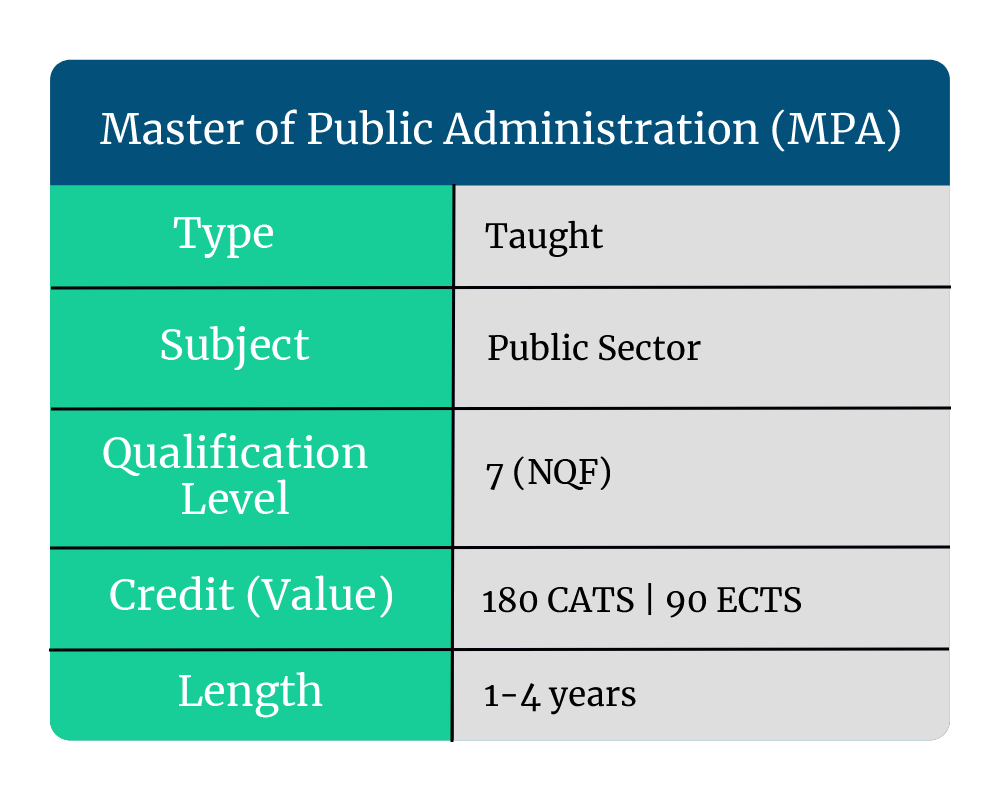
MPA entry requirements
To be considered a place, you must have at least a 2:1 grade or equivalent in any degree. For some universities, there may be no prior experience required, however, you may still need a year or two.
If you have a 2:2 grade, some previous work experience could be beneficial to be considered.
Competition or places could be very high, so you may not guarantee an admission offer, so be sure to create a solid application prior to applying.
How long is an MPA and how many credits is it worth?
The length of the degree depends on the course and the university. In some places, you are able to complete the degree in a single year, however, there are ones for which you will require two years. For those looking to complete part-time, you’ll have to double it.
Which career path can an MPA steer you towards?
As a degree which focuses on the public sector, most career positions you can continue or enter will be within the public or charity industry. These include positions such as:
- Data Analyst
- Development Coordinator
- Executive Director
- Financial Analyst
- Logistic Analyst
- Human Resources Management
- Public Affairs
- Public/Education Consultant
Master of Public Health (MPH)
If you’re looking into a career in the public health industry, you may wish to consider an MPH degree to either help further your career prospects in the industry or to specialise in a certain field.
What is MPH?
MPH stands for Master of Public Health and it’s a degree aimed at students who are interested in developing their research skills in the public health sector in both medical and non-medical backgrounds. Most often, courses in public health can be awarded as a Master of Science (MSc) or a Master of Engineering (MEng).
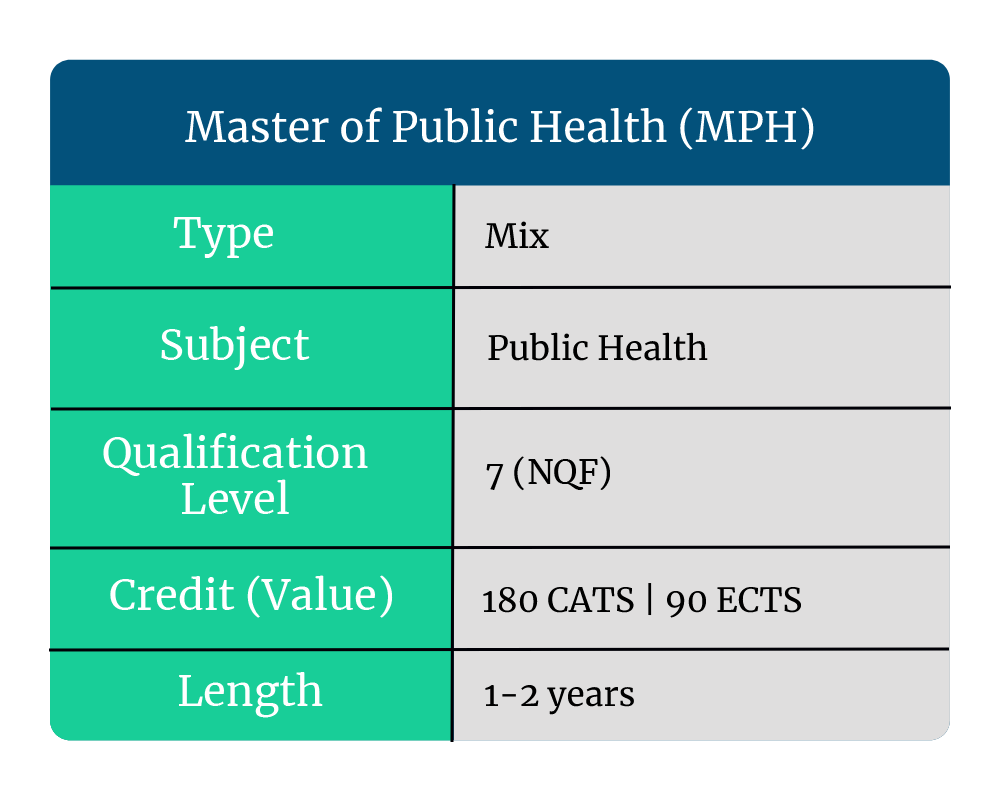
MPH entry requirement
Ideally, you should have background experience in health and public health similar type positions before applying. These positions can come across industries such as
- Charities (inc. NGO’s)
- Dentistry
- Government
- Medicine
- Mental Health
- Nursing
- Social Work
Typically, you can apply if you have at least a 2:1 undergraduate degree, but if you have a lower grade, your application may be considered if you demonstrate significant relevant work experience, and aspirations, and offer a related graduate qualification.
How long is an MPH and how much is it worth?
Typically, an MPH is worth 180 CATS or 90 ECTS. The breakdown usually consists of four 15-credit modules in addition to a further two 15-credit or one 30-credit module. There will be a 30-credit module and one 60-credit dissertation. These can vary depending on the university.
MPH lasts for a year or two years part-time.
Which career path can an MPH steer you towards?
With a subject focused on public health, you would expect the career path to focus on the population and communities rather than a specific person with whom medicine is favourable.
There are a number of options one can do with an MPH some include government or private roles such as:
- Biostatistician
- Environmental Scientist
- Epidemiologist
- Food and Water Quality Officer
- Hazardous Waste Specialist
- Health Worker
- Healthcare Management
- Infectious Disease Consultant
- Nutritionist Consultant
- Public Health Officer/Educator
Masters Degree in Physics (MPhys)
If you’re looking to specialise in a specific field of physics in an integrated Master’s degree programme, you should be looking to advance into an MPhys.
What is an MPhys?
MPhys stands for Master of Physics and it is an integrated Master’s programme similar to a Master of Mathematics (MMath). An integrated Master’s is a program which combines the education of undergraduate and Master’s into one degree in the same institution.
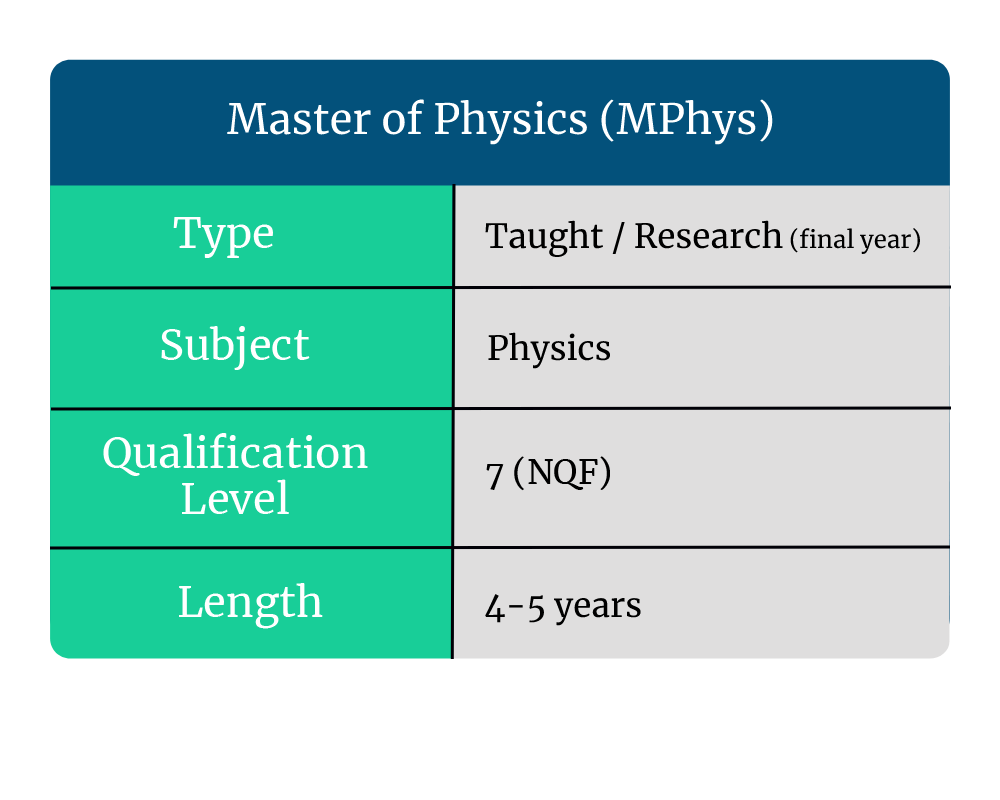
MPhys is a taught subject with research elements in the fourth and final year. However, the courses can differ and there could be more research elements than taught in the final year, but could also be accompanied by various projects. In addition, depending on the university, the final year could be considered equivalent to a Master of Science (MSc).
Some universities offer degrees in specialised fields such as Lancaster University’s physics department which include:
- MPhys Physics
- MPhys Physics with Biomedical Physics
- MPhys Physics with Space Science
- MPhys Theoretical Physics with Mathematics
MPhys entry requirements
To be considered, you should aim to have taken physics and maths during your A-Levels and achieve at least AAB grades. Ideally, for top-tier universities, you should aim to have a minimum of A*AA with the A* in physics, maths or further mathematics.
You should also undertake extra qualifications to improve your knowledge and understanding of the field. This can be done through a number of different qualifications which you can find out at your college, sixth form, prospective university, or elsewhere outside of education.
To apply, you’ll have to go through UCAS. As an integrated programme, you may also need to provide proficiency in the English Language, you can find out more information here.
How long is an MPhys?
For most universities, MPhys lasts four straight years, however, there are a selected few that last 5 years.
The first three years are classified as the undergraduate Bachelor years while the final year or two are classified as the Master’s. Because of this, the end of the third year will contain academic performance examinations to see if you are allowed to progress into the final year.
The first part of the degree is taught teachings while the second part has research elements. In addition, you should expect to complete one or two projects in your final year.
Which career path can an MPhys steer you towards?
As a physics degree, you should expect the degree will help you progress within the scientific industry, depending if you chose a specialised field. To take the program as a non-specialised and generic degree, a physics degree can steer you towards a career path in:
- Aeronautical Engineer
- Astronomer
- Astrophysics
- Chemical Engineer
- Computer Programmer
- Education Teacher
- Geophysics
- Meteorologist
- Nuclear Engineer
- Physicist
- Researcher
Master of Studies (MSt)
If you’re looking into studying for a part-time degree in Oxbridge, you may be looking at a Master of Studies (MSt) degree.
What is an MSt?
The Master of Studies is a postgraduate degree awarded for selected courses mainly at the University of Cambridge and the University of Oxford (Oxbridge). There are other universities that can award an MSt such as the University of Manchester, University of Newcastle and the University of St. Andrew.
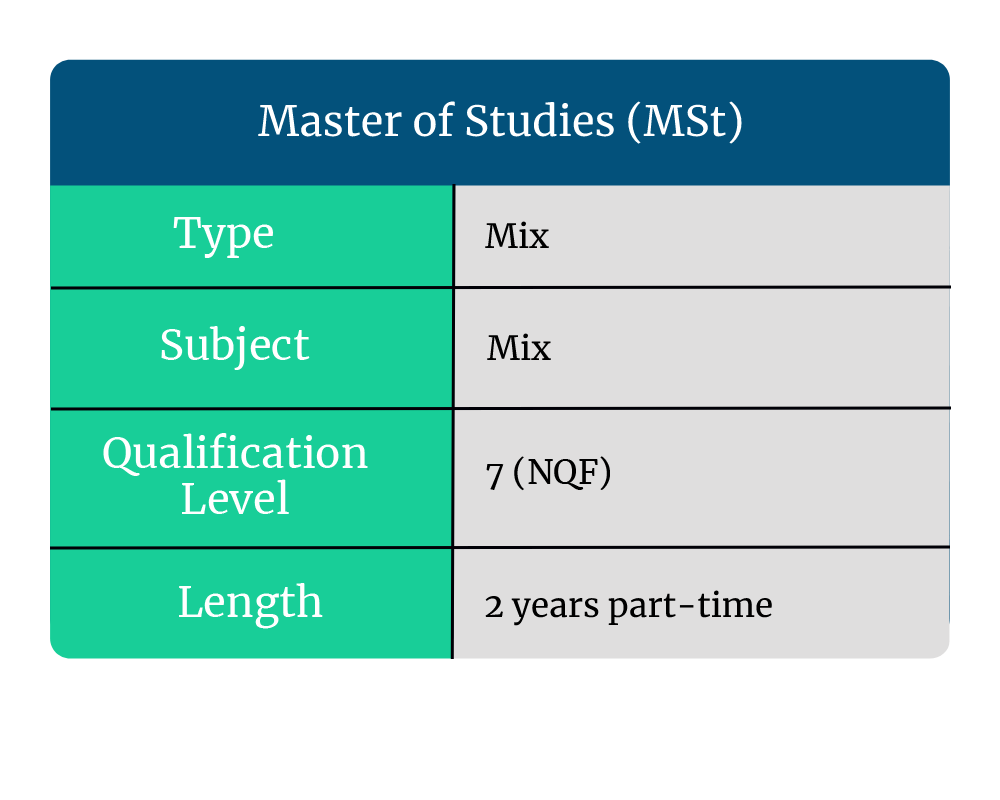
To be awarded an MSt at Oxbridge, you have to study selective part-time courses including art, history and social sciences. The MSt requires an individual to complete classroom study and a thesis at the end of the second academic year.
MSt entry requirements
Applicants will usually need a minimum grade of 2.1 on their undergraduate or equivalent degree, however, some courses may require a minimum of 2.2. In addition, you will most likely need a few years of experience in a similar field to the degree you want to study.
You may also need to show proof of an English language certificate, you can find out more information here.
How long is an MSt
As an MSt is handed out for selective part-time courses, the course lasts for 2 years. During that time, you should expect classes to be held in block timetable, sometimes over the course of an entire month or over a season.
Which career path can an MSt steer you towards?
This is not a simple answer compared to other degrees. In fact, it solely depends on the course you have taken.
If you took an MSt in Creative Writing, then you can go into roles such as marketing, teaching, and history.
Likewise, an MSt in Applied Criminology and Police Management will allow you to enter a public role.

